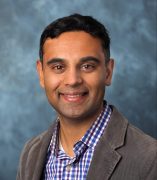
Mahesh Somashekhar, PhD
Assistant Professor
Sociology
Pronouns: He/Him/His
Contact
Building & Room:
4170 BSB
Address:
1007 W Harrison St.
Office Phone:
Email:
CV Download:
Related Sites:
About
Mahesh Somashekhar’s core research agenda concerns two questions: How does urban economic development affect marginalized communities? And how do marginalized communities contribute to urban economic development? He answers these questions in the context of gentrifying neighborhoods, immigrant entrepreneurship, gayborhoods, and religious communities.
Dr. Somashekhar is currently pursuing two projects. The first aims to understand the effect of gentrification on local retailers and community organizations. To that end, he is digitizing and geocoding the U.S. Gayellow Pages, a national directory of local LGBTQ businesses, political groups, community centers, health clinics, churches, and other organizations that has been in continuous publication since 1973. He is using these data to understand whether LGBTQ organizations are surviving the gentrification of gayborhoods, where these organizations are moving when they are displaced, and what kinds of organizations are best positioned to survive gentrification.
The second project examines the rapidly growing business sector that caters to Christian Nationalist consumers. Much research focuses on Christian Nationalism as a political and cultural phenomenon, but it is an economic phenomenon as well. Using both qualitative and quantitative analysis, this project investigates the kinds of businesses that take part in the Christian Nationalist business sector, where those businesses are located, the marketing tactics they use, and their motivations for selling goods and services. The project ultimately details how a broad coalition of economic, religious, and political actors built the Christian Nationalist marketplace as an alternative to the mainstream economy, promoting a unique moral worldview that encourages consumption while discouraging engagement with mainstream social institutions.
Dr. Somashekhar’s research has been published in journals including Social Problems, City & Community, Urban Affairs Review, and Economic Development Quarterly. His work won an award from the American Association of Geographers and has been supported by the National Science Foundation. For the latest information about his research and public engagement efforts, please consult his personal website.